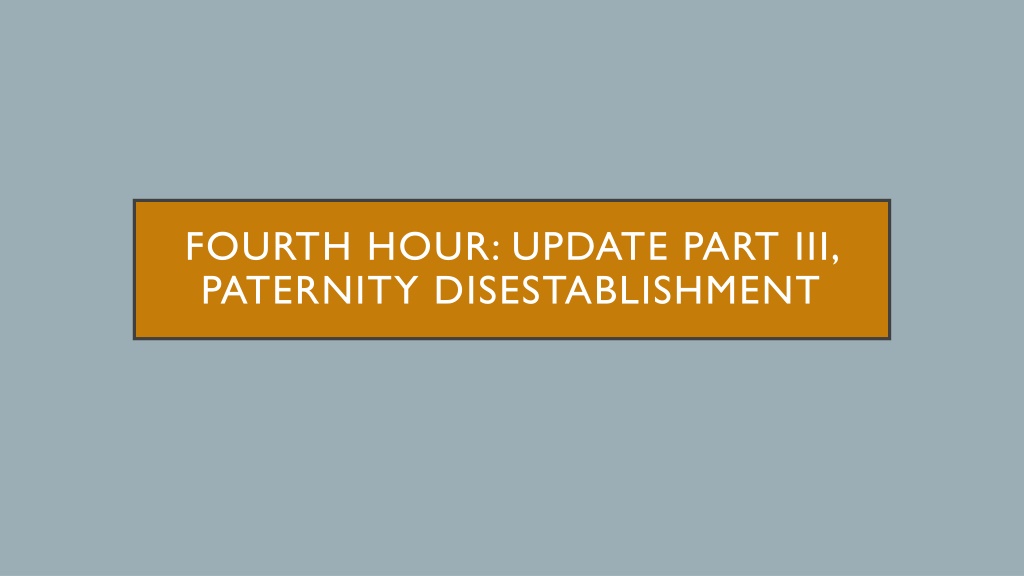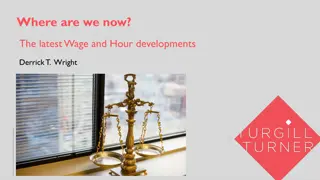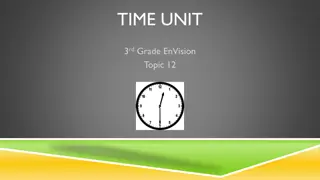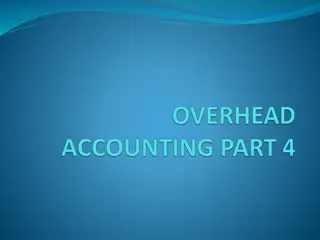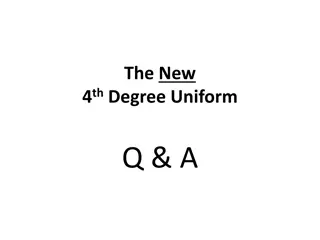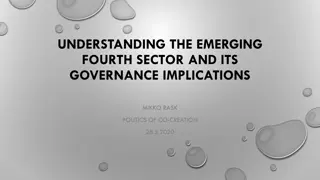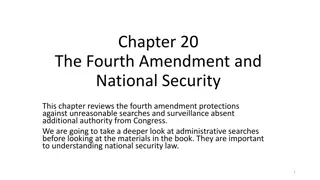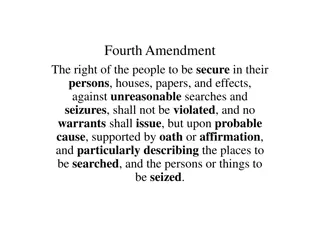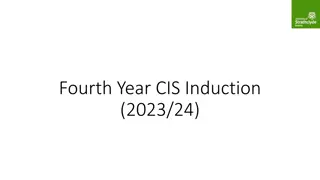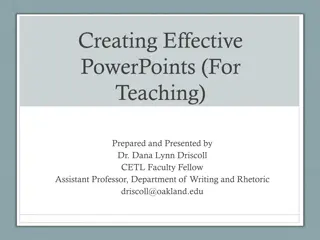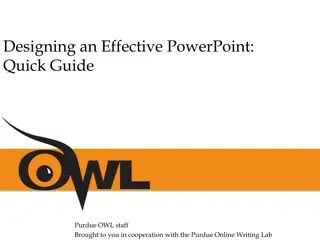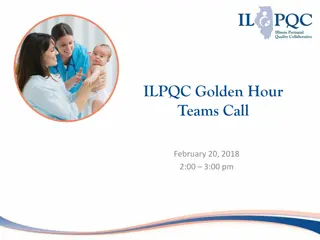Legal Updates on Paternity Disestablishment and Arrearages Enforcement
The updates cover aspects of paternity disestablishment and enforcement of arrearages in family law cases. Key points include rules on arrearages forgiveness, direct and constructive criminal contempt, and recent Supreme Court rulings on the Indian Child Welfare Act.
Download Presentation

Please find below an Image/Link to download the presentation.
The content on the website is provided AS IS for your information and personal use only. It may not be sold, licensed, or shared on other websites without obtaining consent from the author. Download presentation by click this link. If you encounter any issues during the download, it is possible that the publisher has removed the file from their server.
E N D
Presentation Transcript
FOURTH HOUR: UPDATE PART III, PATERNITY DISESTABLISHMENT
ENFORCEMENT: ARREARAGES General rule: Support is vested when due and cannot be forgiven or modified except prospectively. Wallace v. Wallace: A father was not entitled to credit against arrearages based on a change in custody; their agreement stated that child support could be altered only by court order. Exception: A payor s arrearages may be forgiven for a period in which a child lived with the payor. NOTE: In recent years, the appellate courts have held that it is error to refuse to forgive arrearages based on a change in custody or emancipation. Exception: A payor s arrearages may be excused based on a child s emancipation.
A father was not entitled to a credit against arrearages for payments for daughter s cheerleading pursuant to an out-of-court agreement -- they were a voluntary undertaking on his part. KELLY V. KELLY A parent may receive credit against arrearages for direct payments ONLY for basic necessities that would be covered by child support.
March 7 Hearing date; continued indefinitely; parties later agreed to April 7 hearing date April 6 wife retained new counsel who requested continuance, which was denied New counsel informed the court by email they would not appear on April 7 April 7 Chancellor held former attorney, new attorneys, and wife in contempt and fined them $250/day SEALS V. STANTON Criminal contempt
CRIMINAL CONTEMPT Direct criminal contempt Seals v. Stanton: - takes place in the court s presence Attorneys who emailed a court their intention not to attend a hearing were in direct criminal contempt. - does not require notice or a hearing Constructive criminal contempt - takes place out of the court s presence An attorney who failed to appear was in constructive criminal contempt and was entitled to notice of the charge and a hearing. - requires notice and a hearing
The Supreme Court upheld the Indian Child Welfare Act provision providing preferences in foster care and adoption - first, for a child s relatives; - second, for members of the child s tribe; and - third, for members of other tribes. HAALAND V. BRACKEEN The Court held that the statute does not impermissibly intrude on state family law matters.
Custody jurisdiction lies in a childs home state the state where the child has lived for six months within six months of the filing of the action. UCCJEA HOME STATE JURISDICTION Smith v. Banks: Mississippi lacked jurisdiction in a case filed within weeks of a mother s bringing her son from Louisiana to Mississippi and enrolling him in school in Mississippi. Louisiana was the state with jurisdiction to hear a custody action.
When a parent requests that a child testify, a chancellor must - interview the child in chambers and record the interview; - determine whether the child is competent to testify and whether the evidence is relevant; AND DENHAM V. DENHAM - determine whether it is in the child s best interest to testify. If the request is denied, the court must make findings in the record of the reason for the denial and what the child s testimony would have shown.
1. Should a nonbiological legal father be allowed to disestablish his paternity over the objections of the child s mother? 2. If so, should he be allowed to sue for damages in tort and should those damages include previously paid child support? Should a nonbiological legal father be allowed to maintain his legal status over the objection of the mother and/or biological father? PATERNITY DISESTABLISHMENT AND PATERNITY FRAUD SUITS 3.
Amarital father may disestablish if - newly discovered evidence after the child s birth shows he is not the child s father; - he did not adopt the child and the child was not conceived insemination during the marriage; - he did not prevent the biological father from having a relationship with the child; and - he did not voluntarily assume the duty of support knowing the child was not his. DISESTABLISHMENT BY MARRIED FATHER by artificial MISS. CODEANN. 93-9-10(2)(3).
NONMARITAL FATHER: PATERNITY ACKNOWLEDGMENT A man who signed an acknowledgment of paternity may disestablish if - he proves fraud,duress,or mistake; - he did not prevent the biological father from having a relationship with the child;and - he did not cohabit with the mother and voluntarily assume a duty of support knowing the child was not his. MISS.CODEANN. 93-9-9,10(3).
NONMARITAL FATHER: PATERNITY ACTION A man whose paternity is established through a paternity suit in which he declined or did not appear for DNA testing, or in which he entered an agreed order of paternity, may not disestablish his paternity. MISS. CODEANN. 93-9-10(3).
DAVIS V. DAVIS A legal father sued the mother and alleged biological father for fraud and intentional infliction of emotional distress and the alleged father for alienation of affection. He sought damages for the cost of raising both children plus damages based on fraud and intentional infliction of emotional distress. The jury awarded him $700,000 against both defendants for alienation of affection. The supreme court held that the alienation of affections statute of limitation had run and the verdict form did not include other causes of action.
A nonbiological father sued the childs mother for reimbursement of child support. The supreme court held that the support belonged to the child, was vested, and could not be recovered from the mother. MCBRIDE V. JONES In dicta, the court stated that the father could seek reimbursement from the biological father or could pursue a possible claim against the natural mother for fraud. McBride v. Jones, 803 So. 2d 1168, 1170 (Miss. 2002).
A father disestablished paternity and sued the mother for paternity fraud, seeking recovery of child support. The court of appeals held that the father did not prove fraud. DHS V. RAY The Appellants correctly cite McBride v. Jones for the proposition that a non- biological father is not entitled to reimbursement from a child's biological mother for vested child support payments absent a showing of fraud. Department of Human Services v. Ray, 997 So. 2d 983, 990 (Miss. Ct. App. 2008)
2011 PATERNITY STATUTE Relief granted pursuant to this section is limited to the issues of prospective child support payments, past-due child support payments, termination of parental rights, custody, and visitation privileges as otherwise provided by law. This section shall not be construed to create a cause of action to recover child support paid before the filing of the petition to disestablish paternity. MISS. CODEANN. 93-9-10(5) (emphasis added).
PATERNITY FRAUD ACTIONS Some courts recognize: Some do not: [A]llowing a nonbiological parent to recover damages for developing a close relationship with a child misrepresented to be his and performing parental acts, is not a damage which should be compensable under the law. We find that public policy does not serve to protect people engaging in behavior such as that with which plaintiff's complaint charges defendant, and we will not allow defendant to use her daughter to avoid responsibility for the consequences of her alleged deception. Nagy v. Nagy, 258 Cal. Rptr. 787 (Ct. App. 2d Dist. 1989). Koelle v. Zwirin, 672 N.E.2d 868, 876 (Ill. App. 3d 1996).
In Ray, the court of appeals found that the father failed to establish the elements of fraud, including a material, false representation the speaker's knowledge of its falsity or ignorance of its truth PATERNITY FRAUD IN MISSISSIPPI his intent that it should be acted on the hearer's ignorance of its falsity his reliance on its truth and right to do so his consequent and proximate injury. McBride referred to a possible action for fraud.
SUITS TO RECOVER CHILD SUPPORT Majority rule: A man who disestablishes paternity may not recover previously paid child support. Two states hold to the contrary: Mother s misrepresentation of paternity is a classic case of fraud. Denzik v. Denzik, 197 S.W. 3d 108 (Ky 2006). [A]llowing recovery of child support in tort suit would visit considerable financial instability and hardship upon the custodial parent and the dependent children. Nothing in this subsection (b) shall preclude the issuance of a judgment against the mother or actual biological father of the child or children in favor of the [nonbiological legal father]. TENN. CODEANN. 36-2-309(b). Hilaire v. DeBlois, 721 A. 2d 133, 136 (Vt. 1998)
In 2019, the supreme court created a new rule governing a nonbiological father s right to maintain a relationship with a child. - If the biological father is in the picture the nonbiological father is treated as a third party and must overcome the natural parent presumption. BALLARD V. BALLARD - If the biological father is not in the picture, a man who acted in loco parentis is entitled to parental status equal to the child s mother in a custody action.
